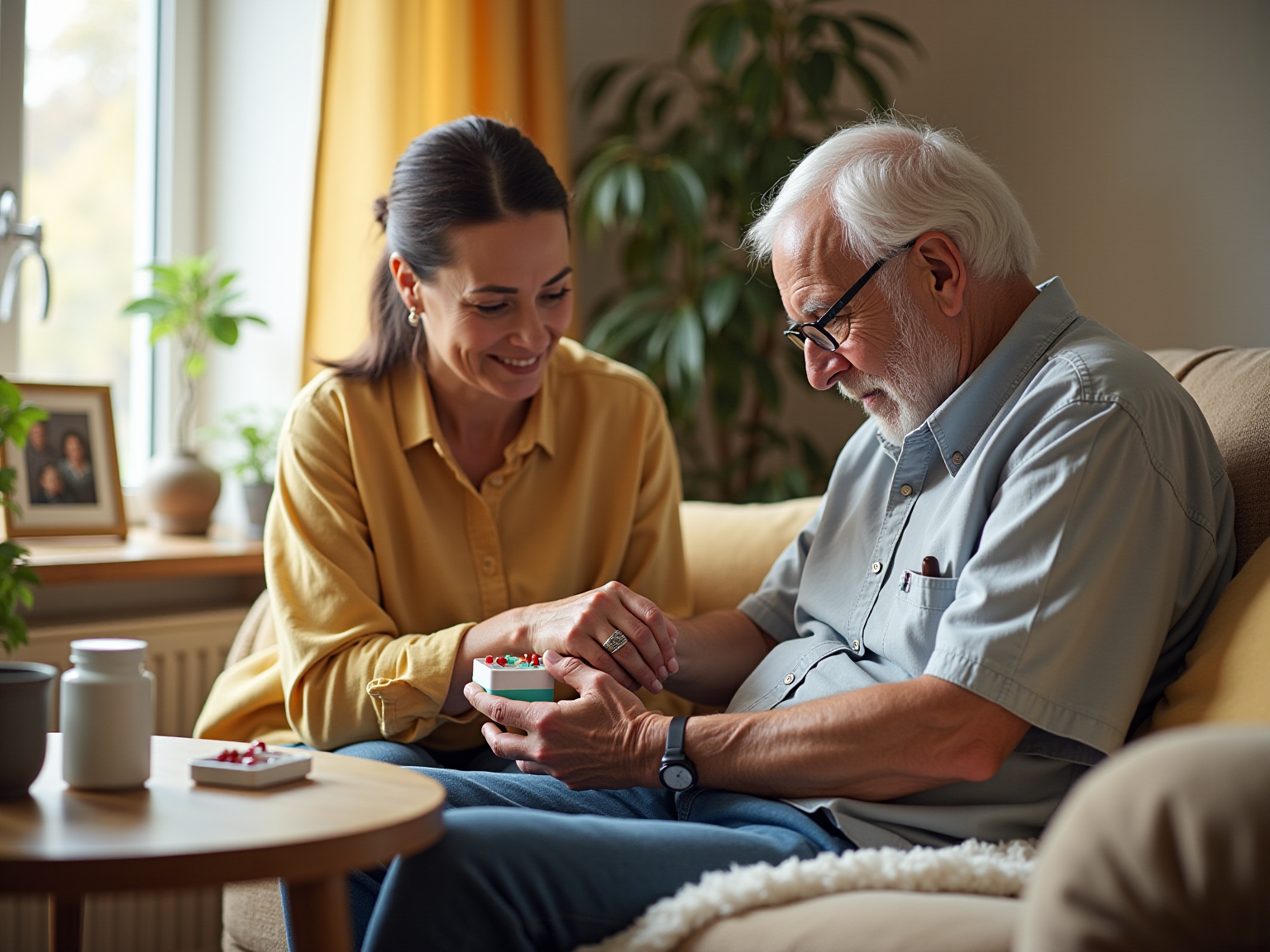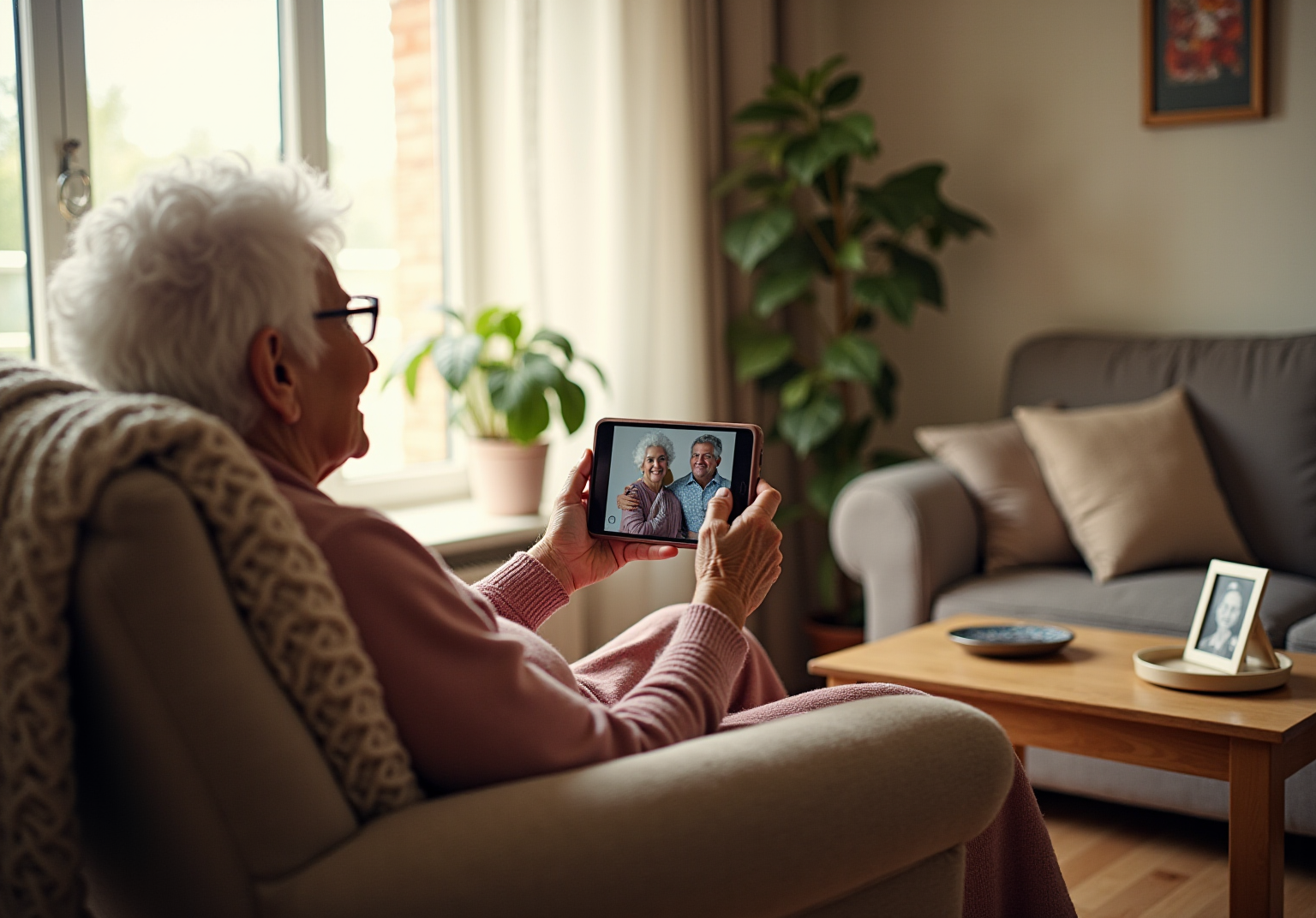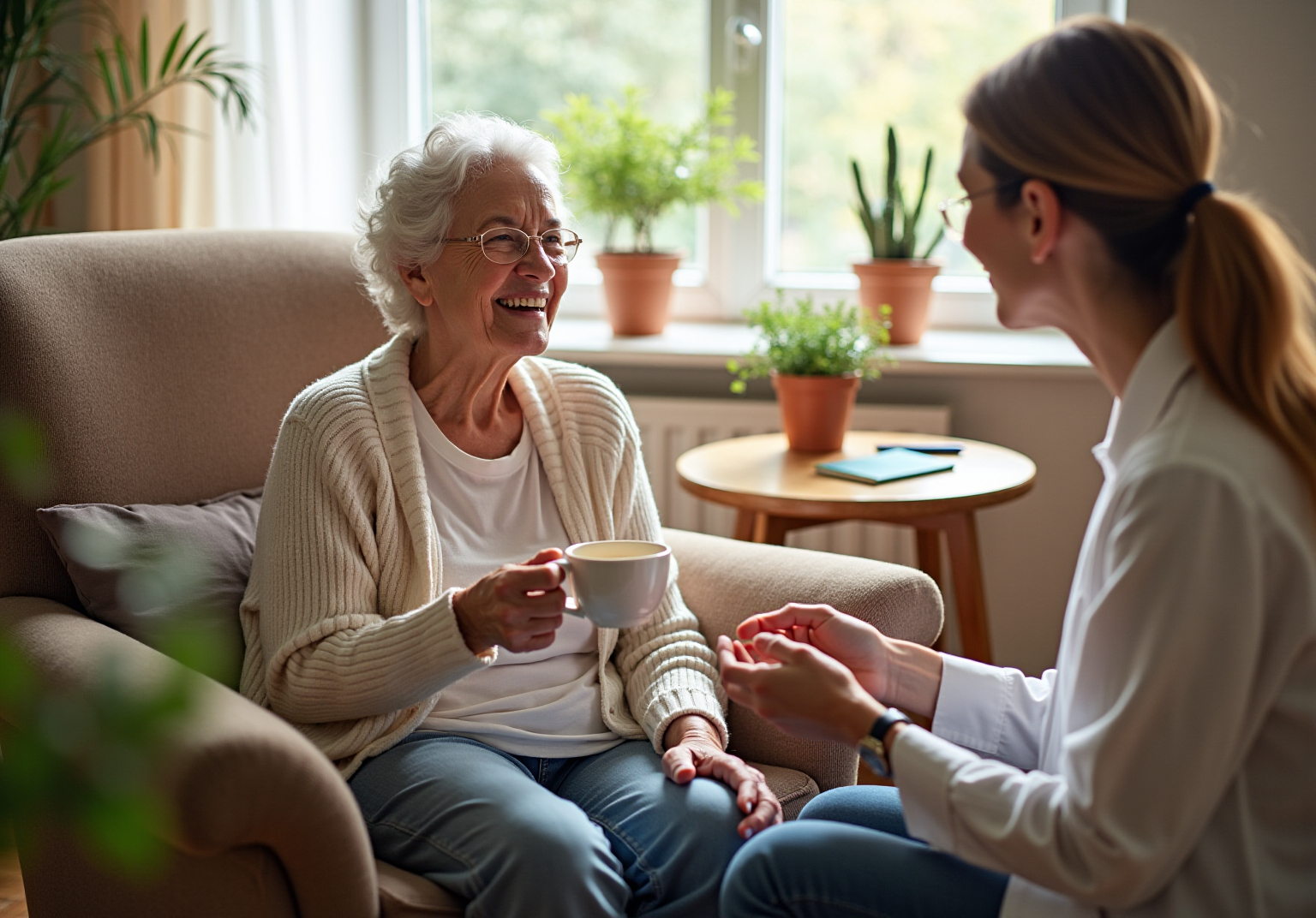Overview
Caring for seniors is a deeply personal journey, and best practices for caregivers can make a significant difference. Personalized care plans, effective communication, and the thoughtful use of technology are essential in enhancing the quality of care. By conducting thorough needs assessments, establishing comforting routines, and utilizing helpful tools like medication management apps, caregivers can improve the well-being of both themselves and the elderly individuals they support.
In addition, these strategies not only address the practical aspects of caregiving but also nurture the emotional connections that are so vital. Caregivers often face challenges, and it’s important to recognize their feelings and concerns. By implementing these best practices, they can foster a more harmonious environment that benefits everyone involved.
Furthermore, as caregivers embrace these approaches, they may find a renewed sense of purpose and fulfillment in their roles. Technology can serve as a powerful ally, providing resources that simplify tasks and enhance communication. Remember, your comfort and confidence in the care you provide are our priority, and we’re here for you every step of the way.
Introduction
In the intricate landscape of senior care, caregivers emerge as the unsung heroes, providing not just physical assistance but also crucial emotional support to the elderly. Their roles encompass a wide range of responsibilities, from managing medications and coordinating healthcare appointments to offering companionship that can significantly enhance a senior’s quality of life.
However, the journey of caregiving is fraught with challenges, including physical strain, emotional stress, and the financial burdens that often accompany this demanding role.
As the population ages, understanding the multifaceted impact of caregivers becomes increasingly vital. What challenges do they face daily? This article delves into the essential functions of caregivers, the hurdles they encounter, and the strategies that can empower them to deliver the best possible care to seniors. Together, we can ensure that both caregivers and their clients thrive in this critical relationship.
Understanding the Role of Caregivers in Senior Care
Caregivers for seniors are truly essential in the field of elderly care, serving as the primary support system for older individuals. Their responsibilities extend beyond basic assistance with daily activities like bathing, dressing, and meal preparation; they also offer vital companionship and emotional support. Caregivers play a crucial role in managing medications, organizing medical appointments, and facilitating communication with healthcare providers, all of which are critical for preserving the health and welfare of older adults.
The impact of caregivers on the overall health and happiness of older adults cannot be overstated. Research shows that caregivers significantly contribute to the emotional and psychological well-being of their clients, fostering connections that are vital for mental health. In fact, a study revealed that family supporters, who often face extreme stress, can experience accelerated aging, potentially losing up to ten years of their life due to the pressures of providing care, as noted by Elissa S. Epel from the University of California, San Francisco.
Statistics further underscore the importance of those providing assistance in elderly care. In 2025, it was reported that 65.7% of eldercare providers focus solely on household members, while 18.8% extend their services to non-household members. This highlights the vital function that caregivers hold in assisting not only their own relatives but also the broader community of elderly individuals in need.
Furthermore, information examined from 92,461 individuals providing care and 353,242 non-providers emphasizes the substantial effect that caregivers have on the health outcomes of older adults. Without adequate support services, caregivers may struggle to prevent health deterioration, inadequate nutrition, hygiene problems, mobility difficulties, social seclusion, and medication mishandling, all of which can greatly influence quality of life. A case study from 2007 demonstrated the financial strain on family supporters, who incurred an average of $5,531 each year in out-of-pocket costs associated with providing care, which amounted to over 10% of their median income.
This economic pressure highlights the necessity for financial aid and support systems for those who frequently balance numerous responsibilities. Connecting this to present difficulties, it is clear that caregivers today still encounter comparable financial strains, requiring continuous assistance.
In conclusion, caregivers for seniors are essential to the well-being and joy of older adults, providing not only physical assistance but also emotional support that enhances quality of life. Their multifaceted roles and the challenges they face underscore the importance of recognizing and supporting caregivers in their vital work. If you or your loved ones need assistance, remember that we are here for you. Call (888) 203-2529 to schedule a consultation with Best Care Nurses Registry.
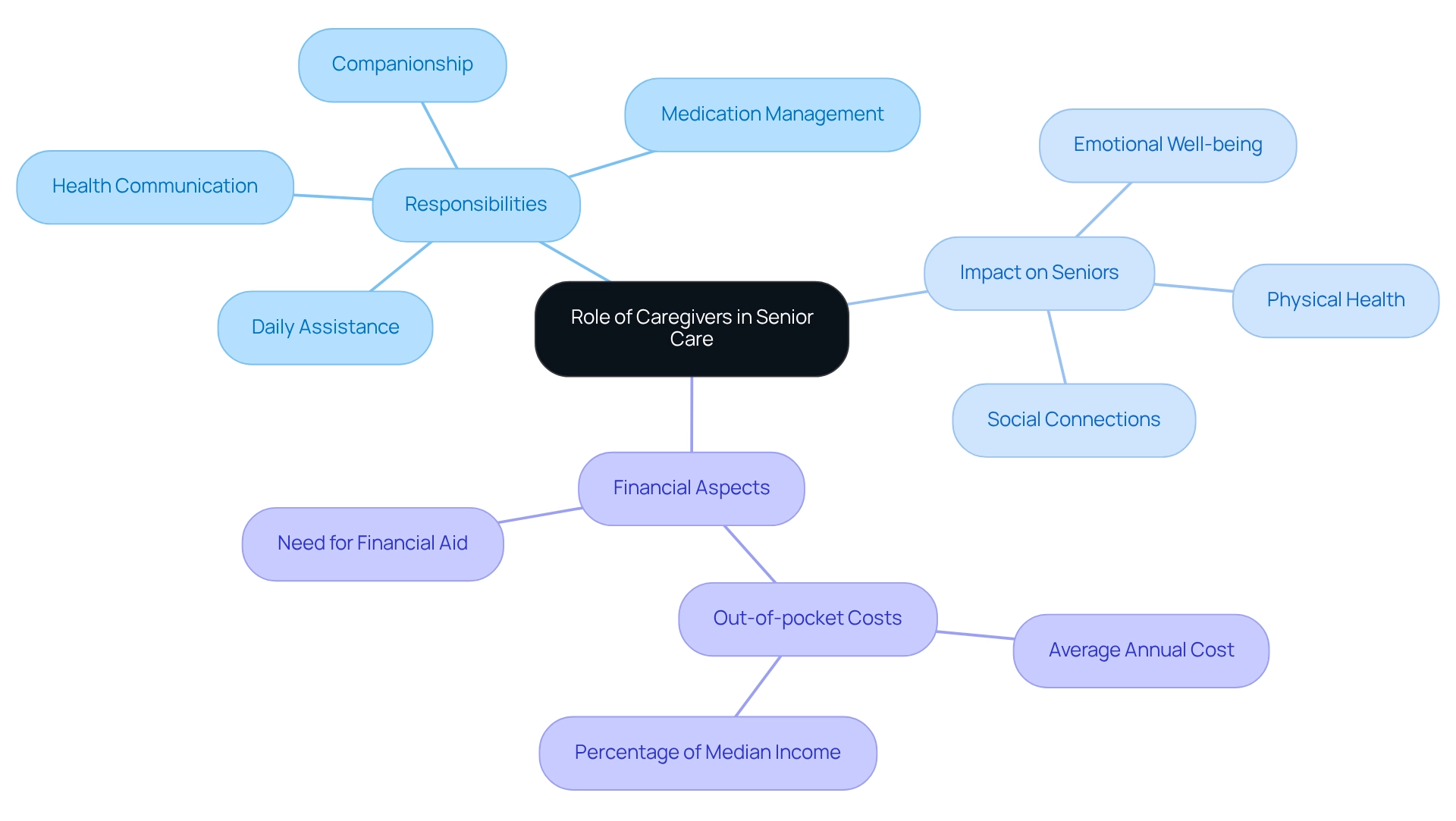
Common Challenges Faced by Caregivers
Caregivers for seniors often face numerous challenges that can impede their ability to provide the highest quality of care. The physical demands of caregiving, such as lifting or assisting seniors, can lead to significant strain and injury. Additionally, emotional stress plays a crucial role, as caregivers frequently grapple with the weight of their responsibilities, resulting in feelings of isolation and being overwhelmed.
This emotional burden is further exacerbated by the struggle to balance personal lives with caregiving duties, which can lead to burnout—a condition affecting nearly 40% of family supporters. Elissa S. Epel from the Department of Psychiatry at the University of California, San Francisco, notes that family supporters under extreme stress may age prematurely, potentially losing as much as 10 years from their lives due to this overwhelming stress.
Recognizing these challenges is vital for implementing effective support measures. Best Care Nurses Registry offers tailored respite services, allowing caregivers for seniors to take much-needed breaks and rejuvenate, thus preserving their well-being. Our in-home caregivers provide companionship and assist with everyday activities, such as:
- bathing
- grooming
- toileting
- transferring
- light housekeeping
- meal preparation
- medication reminders
This ensures that seniors receive the support they need while caregivers can focus on their own well-being.
Importantly, there are no minimum service hour requirements, enabling individuals to receive assistance customized to their specific needs. Support groups provided by Best Care create a platform for caregivers to share experiences and strategies, fostering a sense of community and reducing feelings of isolation. Furthermore, educational materials equip supporters with the knowledge needed to manage complex health activities, such as medication oversight, which can often be a significant source of stress.
Statistics reveal that 79% of supporters seek information, assistance, or backing from healthcare professionals during health challenges, underscoring the importance of communication and teamwork in support roles. Best Care Nurses Registry collaborates closely with most long-term assistance insurance providers, accepting assignment of benefits (AOB) to simplify the payment process for our services. However, many caregivers remain unaware of how public policy impacts their responsibilities, highlighting a significant gap in support that needs addressing.
Insights from case studies show that family supporters often handle complex health management tasks and express a desire for better communication with healthcare professionals. By prioritizing education and resources for caregivers of seniors, Best Care Nurses Registry enhances the overall caregiving experience, ultimately benefiting both caregivers and the elderly individuals they assist.
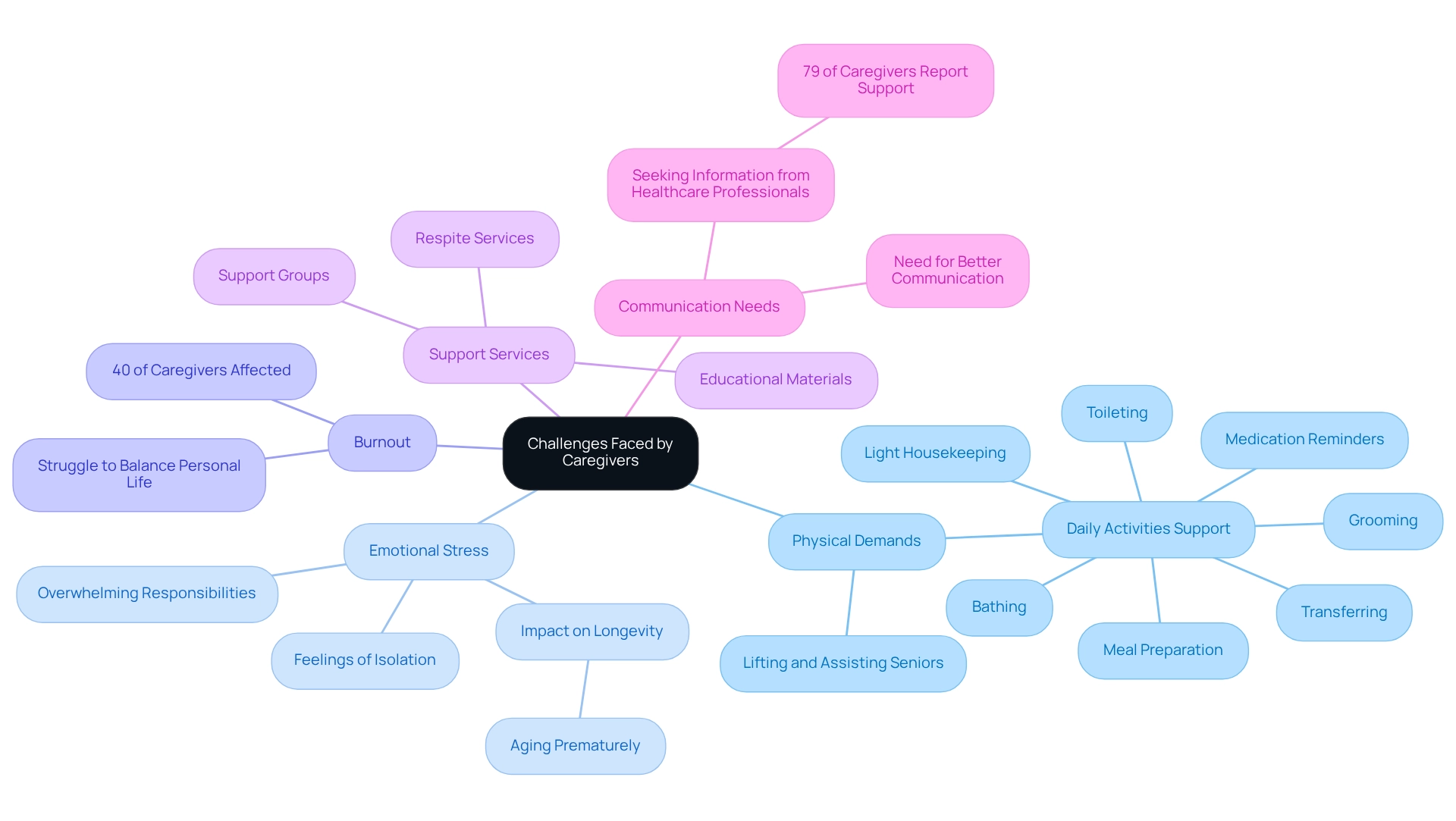
Proven Strategies for Effective Caregiving
To enhance the quality of assistance provided to elderly individuals, caregivers can implement a variety of effective techniques. A thorough evaluation of needs is essential, recognizing the unique demands of each elderly person. This understanding enables caregivers to create personalized care plans that truly reflect individual requirements. Research indicates that effective needs assessments significantly improve caregiving outcomes, with caregivers reporting a Physical Health Index (PHI) score of 77.4%, compared to 83.0% for those not providing care. This underscores the importance of addressing the needs of caregivers as well.
Establishing a consistent routine is another beneficial strategy for caregivers, offering structure and predictability that can greatly benefit elderly individuals. Such routines help alleviate anxiety and confusion, fostering a sense of security. Additionally, caregivers should prioritize open communication with elderly individuals and their families, ensuring that preferences and concerns regarding assistance are actively addressed. This approach not only builds trust but also empowers older adults on their journey of support.
Incorporating technology into caregiving practices can also streamline processes and enhance efficiency. Tools like medication management apps and telehealth services facilitate better monitoring and communication, ultimately leading to improved health outcomes for older adults.
Furthermore, continuous training and education for caregivers are vital to keep them informed about best practices and advancements in elder support. Case studies have shown that individuals engaged in ongoing education are better equipped to tackle the challenges of caregiving, resulting in more effective and compassionate assistance. By embracing these strategies, caregivers can significantly improve the quality of life for older adults, ensuring they receive the individualized and attentive support they deserve.
At Best Care Nurses Registry, we are committed to providing emotional support and tailored assistance solutions, ensuring the safety and happiness of your loved ones at home. Our services include referrals for Certified Nursing Assistants (CNAs) and Home Health Aides (HHAs), trained to assist with both medical tasks and daily living activities. As Karl A. Pillemer notes, understanding the needs of seniors through comprehensive evaluations is crucial for caregivers to deliver effective care.
Moreover, insights into the demographic profiles of caregivers reveal that many are spouses or children of care recipients, highlighting the emotional and physical challenges they face. It is important to recognize that while these statistics provide valuable insights, the reliance on self-report measures necessitates further validation across diverse support provider populations and cultures. By addressing these considerations, caregivers can better navigate the complexities they encounter.
For personalized care solutions, we invite you to contact Best Care Nurses Registry today.
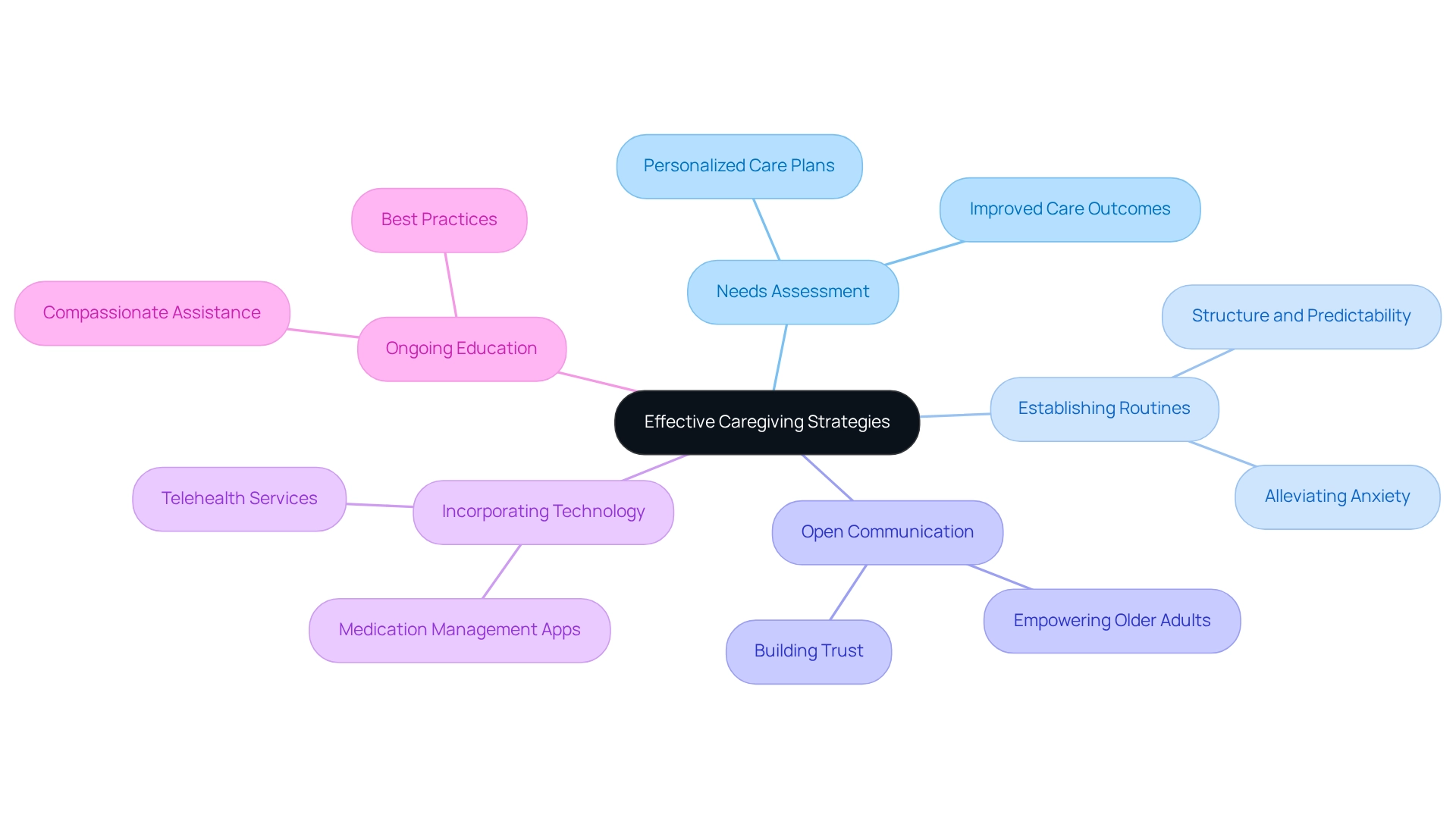
The Importance of Communication in Caregiving
Effective communication is essential in caregiving, as it fosters trust and understanding between caregivers and elderly individuals. Caregivers should prioritize active listening, which ensures that older adults feel valued and understood. This practice goes beyond merely hearing words; it requires attentiveness to non-verbal cues and emotional needs.
Routine check-ins and transparent conversations regarding care preferences enable support providers to tailor their methods, meeting the distinct needs of each elderly individual.
Involving family members in these conversations can significantly enhance the support network for the elder, ensuring that everyone is aligned in their caregiving strategy. Research shows that prompt communication is crucial, especially at the beginning of the treatment process, as it aids in clarifying expectations and alleviates anxiety for both family members and seniors. For instance, one study found that those who look after patients with advanced cancer needed health professionals to clarify their knowledge of death, underscoring the necessity of clear communication in providing care.
By promoting a setting of open communication, caregivers can develop stronger connections, reduce stress, and ultimately enhance the standard of assistance offered.
At Best Care Nurses Registry, we highlight a tailored approach to home assistance services, ensuring that each senior gets the compassionate support they require. Our process starts with a straightforward call to discuss your requirements, followed by a customized care plan created in partnership with your physician. This guarantees that caregivers are well-informed and prepared to address the particular requirements of each individual.
The three straightforward steps to connect with Best Care Nurses Registry are:
- Call to talk with our welcoming staff to discuss your requirements.
- We’ll discuss your situation with you or your loved one and seek a care plan from your doctor that perfectly caters to your needs.
- We will refer compassionate providers whom you select to collaborate with.
Implementing effective communication strategies, such as active listening and empathetic engagement, can lead to higher satisfaction rates for caregivers for seniors. Research indicates that individuals who actively listen and respond to the emotional and physical needs of their clients contribute to a more supportive support environment, enhancing the overall experience for both parties. As one representative participant noted, “I can’t think of anything to do to improve the program. I’ve learned several things to help me do a better job,” highlighting the positive impact of effective communication on performance in the caregiving role. Additionally, referencing the case study titled “6 Tips for Effective Communication in Caregiving” can provide practical strategies and reinforce the importance of skills such as active listening and empathy. By emphasizing the timing of communication, caregivers can ensure that information is shared early, further enhancing the caregiving process.
CNAs and HHAs play a crucial role in assisting elderly individuals with activities of daily living, such as bathing, dressing, and meal preparation. Their extensive daily contact with each patient allows them to keep family members and decision-makers informed about vital information regarding the patient’s condition. By motivating older adults to seek assistance, we can guarantee they obtain the tailored attention they deserve.
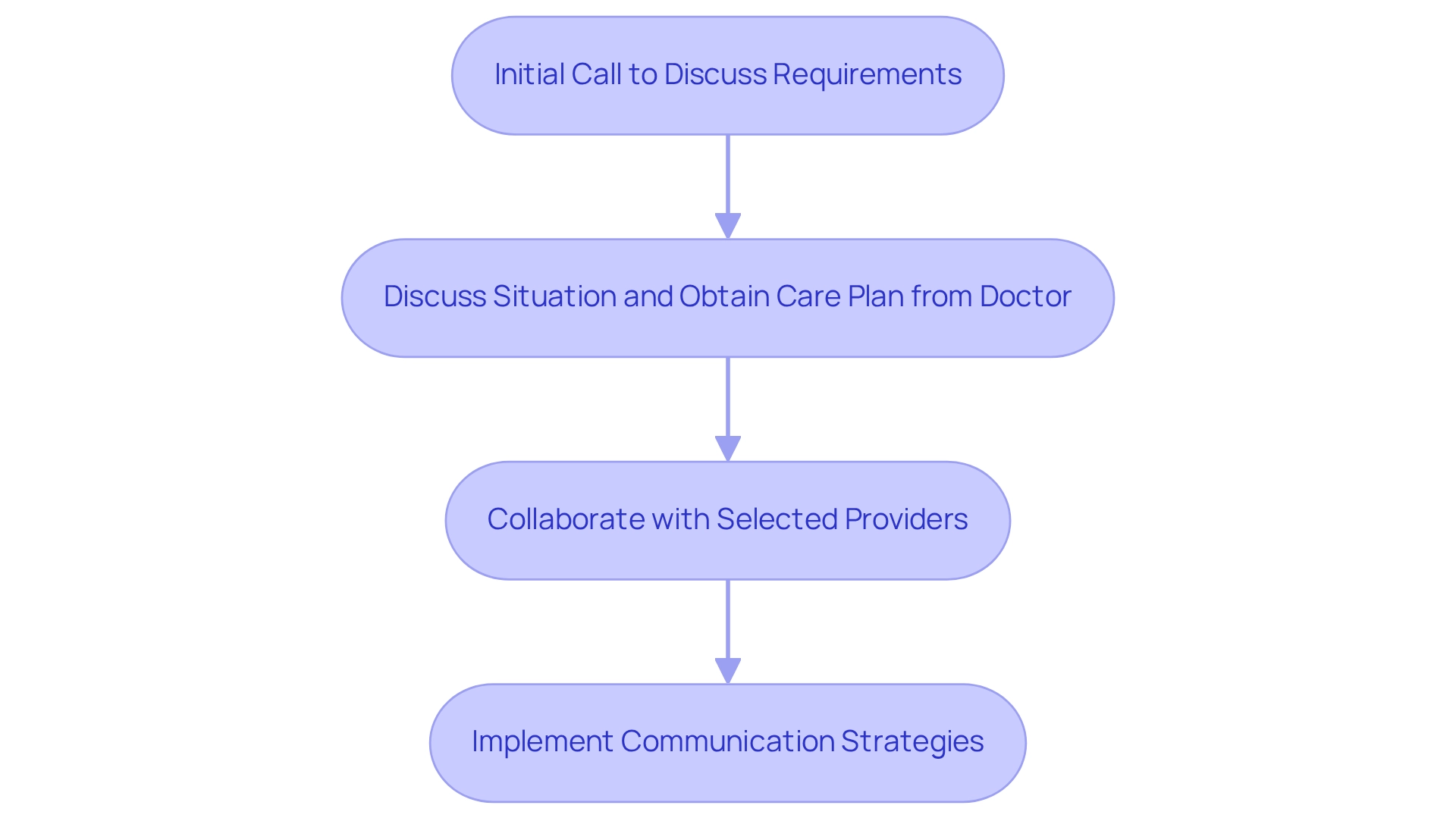
Leveraging Technology to Enhance Senior Care
Technology has emerged as a vital partner for caregivers of seniors, offering innovative tools that significantly improve the efficiency of those providing assistance and ensure the safety of older adults. For instance, medication management applications serve as essential reminders for elderly individuals, helping them follow their medication schedules and reducing the likelihood of missed doses. These applications have shown a positive impact on health outcomes, with studies indicating that consistent medication adherence can lead to a 30% reduction in hospital readmissions among older adults.
In addition to these technological advancements, we must not overlook the essential roles of caregivers for seniors, including CNAs and HHAs. These professionals provide invaluable assistance with activities of daily living, such as personal hygiene, meal preparation, and mobility support. Their extensive daily interaction with patients enables caregivers to keep family members informed about crucial health information, ensuring that any changes in an elderly person’s condition are promptly addressed.
This personalized care from caregivers for seniors not only improves the quality of life for older adults but also promotes their independence and dignity.
Wearable devices, including smartwatches and health monitors, play a crucial role in tracking vital signs and notifying those responsible for health concerns. This proactive approach allows for timely interventions, which can be critical in preventing serious health complications. Furthermore, telehealth services have revolutionized access to healthcare for seniors, allowing caregivers to consult with healthcare professionals remotely. This removes the requirement for transportation, making healthcare more accessible and convenient for individuals with mobility challenges.
However, despite these advancements, older adults still face barriers in accessing digital health. A recent case study titled “Improving Access to Digital Health for Older Adults” highlights challenges such as socioeconomic factors and lack of familiarity with technology, which disproportionately affect marginalized groups. To address these disparities, healthcare systems must collaborate to improve access and tailor interventions to the unique needs of older adults.
The incorporation of these technologies not only enhances the quality of services provided by caregivers for seniors but also empowers older adults to preserve their independence. As of 2023, approximately 86% of individuals aged 50 and older are utilizing streaming services, reflecting a growing comfort with technology among older adults. Notably, streaming among the 50-plus population has climbed from 64% in 2019 to 86% in 2023, according to Brittne Kakulla from AARP Research.
This trend highlights the significance of integrating user-friendly technological solutions in elder support, ensuring that caregivers enable older adults to be active participants in managing their health.
Effective applications of medication management tools in elder support environments have shown considerable enhancements in medication adherence and general health results. For example, a recent case study showcased an elderly living community that implemented a medication management app, leading to a 40% rise in adherence rates within three months. Such results demonstrate the capability of technology to revolutionize elderly support, enhancing its effectiveness and responsiveness to the needs of older individuals.
In conclusion, the ongoing development of technology in elderly assistance presents numerous opportunities to enhance the caregiving experience for caregivers for seniors. By adopting these innovations, providers can offer more tailored and effective support, ultimately enhancing the quality of life for older adults.
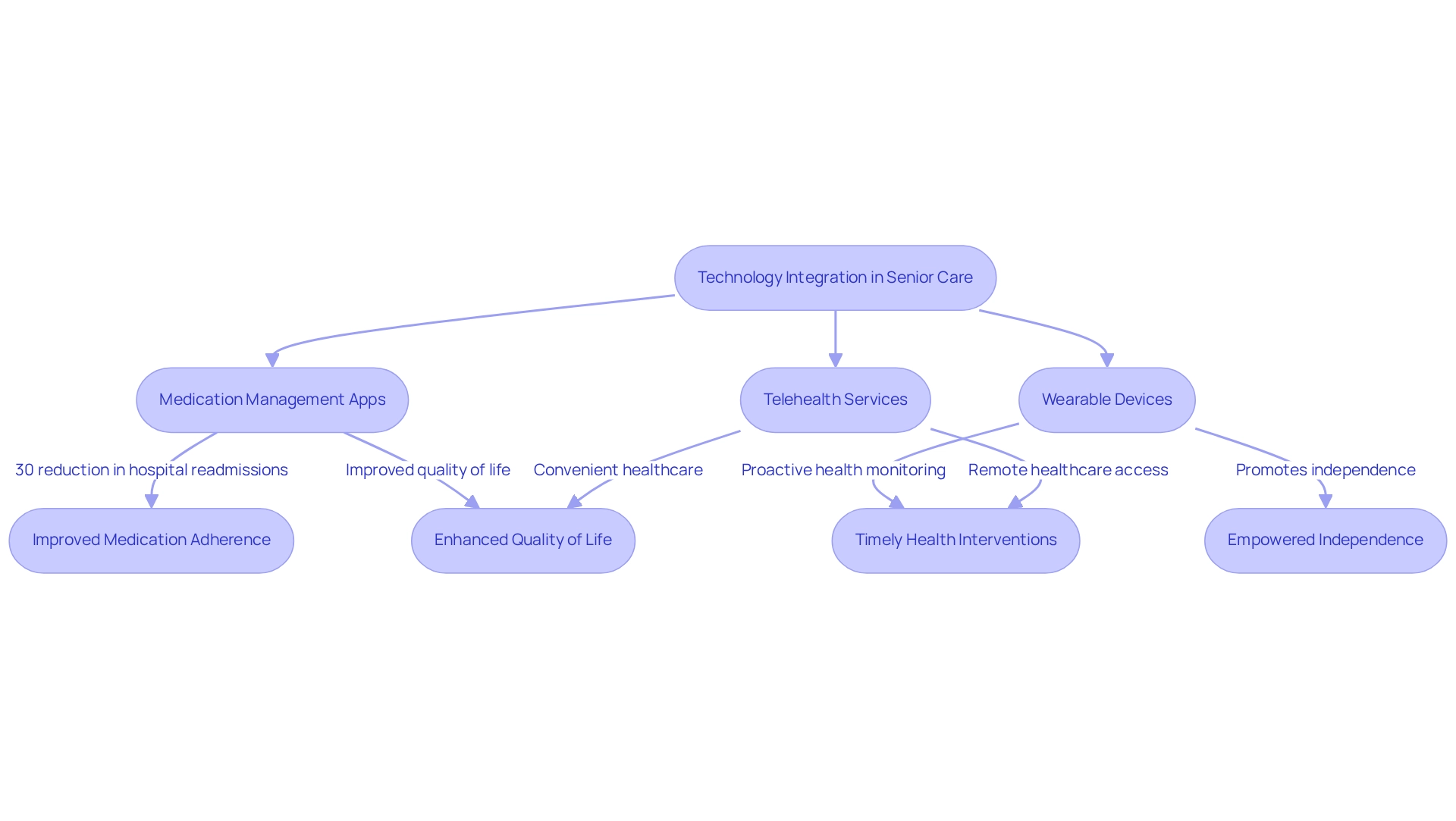
The Necessity of Training and Education for Caregivers
Continuous training and education are vital for caregivers of seniors, ensuring they remain informed about best practices and the latest developments in senior assistance. Caregivers are encouraged to pursue workshops, online courses, and certification programs that cover essential skills such as:
- First aid
- Medication management
- Effective communication techniques
Additionally, participating in peer support groups can provide caregivers with valuable insights and shared experiences, fostering a nurturing sense of community and collaboration.
Statistics reveal that a significant portion of caregivers—19.9%—express a need for training in utilizing smart devices. This highlights the evolving landscape of caregiving and the necessity for ongoing education. By investing in their professional growth, support providers not only enhance their own abilities but also significantly improve the quality of care they offer to elderly individuals.
Community-driven initiatives, which often include educational workshops and support networks, play a crucial role in enhancing the well-being of caregivers and promoting a collaborative atmosphere. These initiatives demonstrate that when caregivers are well-equipped with knowledge and resources, the outcomes for seniors—especially those with complex needs like dementia—improve significantly. Recent studies indicate that ongoing education for caregivers can lead to better caregiving outcomes for individuals with dementia, underscoring the practical benefits of such training.
Recognizing the efforts of caregivers and addressing their needs is essential for developing supportive policies and practices within the caregiving community. As M. Sanjuán observed, “The function of those providing assistance is crucial in the healthcare system, and their education is essential to guaranteeing quality support.” As the landscape of elder support continues to evolve, those who prioritize their education will be better equipped to meet the diverse needs of the individuals they assist.
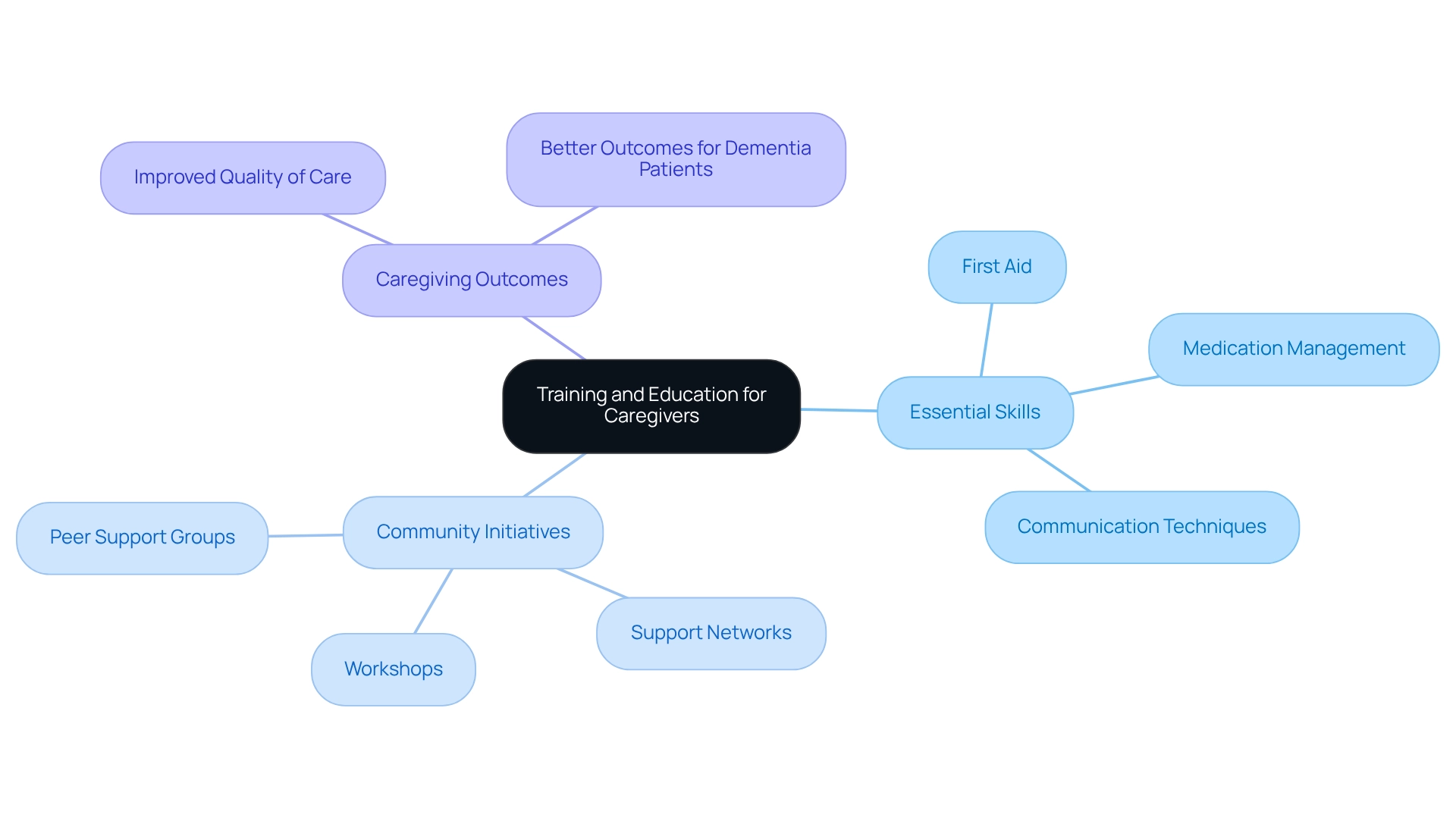
Self-Care Strategies for Caregivers
Self-nurturing is essential for those who provide support, as it directly impacts their well-being and efficiency in delivering assistance. Establishing clear boundaries is crucial; caregivers must prioritize personal time for relaxation and activities that rejuvenate them. Fundamental components of self-care include regular physical activity, a balanced diet, and sufficient sleep, all of which contribute to overall well-being.
At Best Care Nurses Registry, we understand that adaptable respite assistance services can be a vital support system for caregivers of seniors. Our respite support is customizable to meet personal requirements, whether it’s for a few hours or multiple weeks, ensuring that those assisting individuals of all ages—children, adults, and seniors—receive the help they need. This flexibility enables individuals in support roles to take necessary breaks, recharge, and maintain their well-being.
Research shows that 66% of caregivers find it relatively easy to coordinate treatment recommended by health professionals. However, many still encounter difficulties in obtaining affordable assistance, highlighting the need for enhanced support systems for caregivers, as mentioned in the case study titled “Assistance and Support for Care Providers.” This emphasizes the necessity for caregivers to seek assistance from friends, family, or professional counseling services to navigate stress and emotional hurdles effectively.
Participating in hobbies and social activities serves as an essential outlet for caregivers, allowing them to recharge and return to their duties with renewed energy and focus. Case studies reveal that individuals who adopt self-care strategies not only boost their own well-being but also elevate the quality of assistance they offer. Our in-home assistants at Best Care Nurses Registry provide companionship and support with daily activities, ensuring that caregivers can take the time they need without compromising the care for their loved ones.
It is crucial to select licensed providers with appropriate qualifications to guarantee the best support for your loved ones. As Kathryn Sabo, MSN, RN, highlights, ‘Additional investigation is needed on how to best assist caregivers for seniors in fulfilling their caregiving responsibilities while promoting their own health.’ By prioritizing their health and utilizing the personalized support available through Best Care Nurses Registry, caregivers can foster a more sustainable caregiving environment, ultimately benefiting both themselves and those they care for.
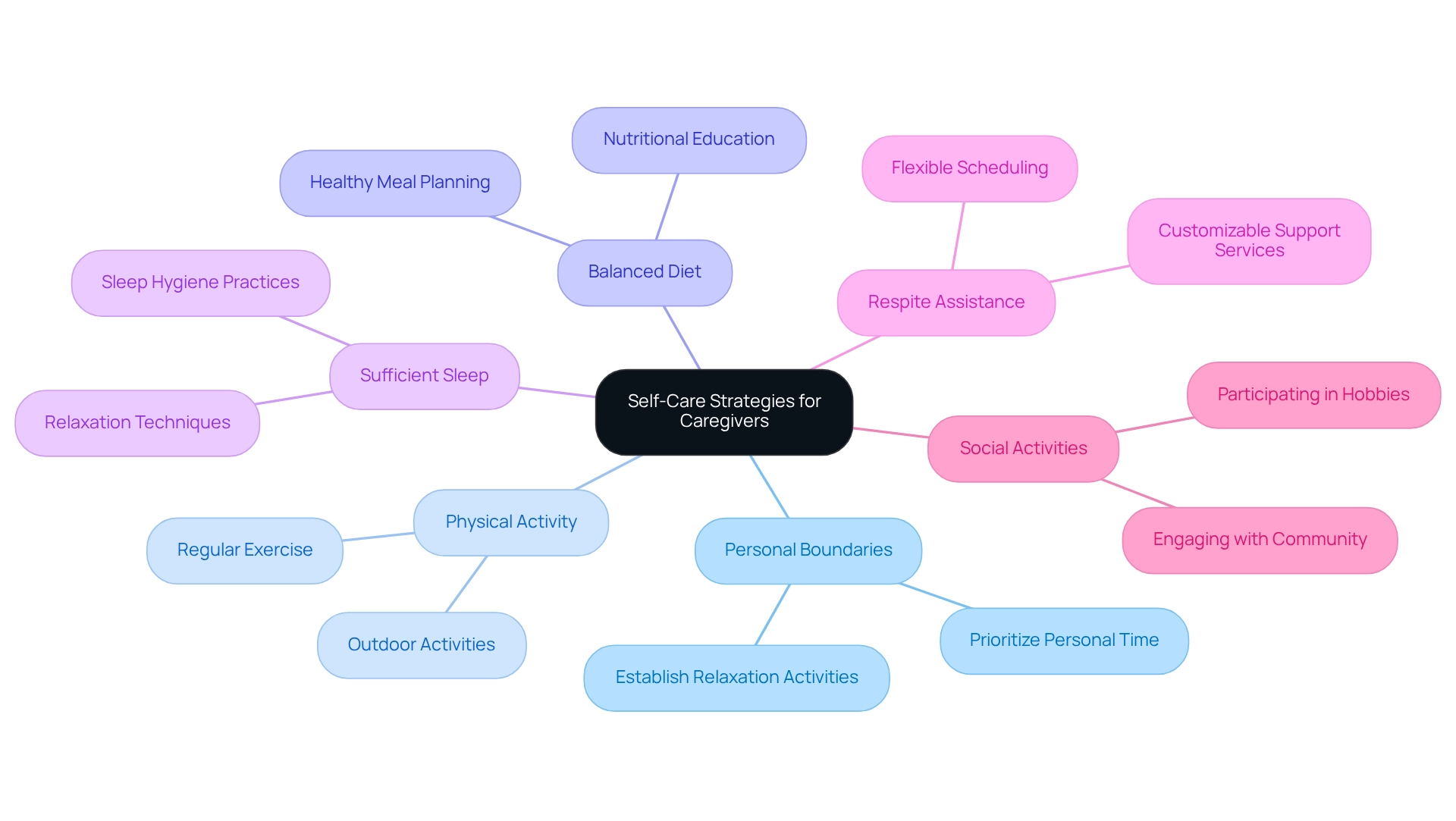
Conclusion
The indispensable role of caregivers in senior care cannot be overstated. They provide not only essential physical assistance but also invaluable emotional support, significantly enhancing the quality of life for elderly individuals. The challenges faced by caregivers—such as physical strain, emotional stress, and financial burdens—highlight the urgent need for recognition and support systems tailored to their unique needs.
Implementing effective strategies, such as thorough needs assessments, open communication, and leveraging technology, can empower caregivers and improve caregiving outcomes. Furthermore, ongoing training and education are crucial for caregivers to stay informed and equipped to navigate the complexities of their roles. These measures not only benefit caregivers but also lead to better health outcomes for seniors, fostering a supportive and thriving caregiving environment.
Ultimately, prioritizing caregiver well-being is essential for the overall effectiveness of senior care. By acknowledging the vital contributions of caregivers and providing them with the necessary resources and support, society can ensure that both caregivers and seniors flourish in this crucial relationship. Investing in caregiver support today will pave the way for healthier, happier tomorrows for our aging population.
Frequently Asked Questions
What are the primary responsibilities of caregivers for seniors?
Caregivers for seniors assist with daily activities such as bathing, dressing, and meal preparation. They also provide companionship, emotional support, manage medications, organize medical appointments, and facilitate communication with healthcare providers.
How do caregivers impact the health and happiness of older adults?
Caregivers significantly contribute to the emotional and psychological well-being of older adults, fostering essential connections that enhance mental health. Their support can lead to improved overall health and happiness for seniors.
What challenges do caregivers face in their role?
Caregivers often experience physical demands that can lead to strain and injury, as well as emotional stress from balancing caregiving responsibilities with personal lives. Nearly 40% of family caregivers report feeling burned out due to these challenges.
What financial burdens do caregivers encounter?
Caregivers often face significant financial pressures, with family supporters incurring an average of $5,531 annually in out-of-pocket costs related to caregiving, which can exceed 10% of their median income.
What support services are available for caregivers?
Best Care Nurses Registry offers tailored respite services, allowing caregivers to take breaks while ensuring seniors receive necessary support. They also provide in-home assistance with daily activities and facilitate support groups for caregivers.
How does Best Care Nurses Registry assist caregivers?
Best Care Nurses Registry provides in-home caregivers for companionship and daily activity assistance, along with educational resources to help caregivers manage health tasks, and support groups to foster community and reduce isolation.
What is the importance of communication in caregiving?
Effective communication with healthcare professionals is crucial, as 79% of caregivers seek information and support during health challenges. Best Care Nurses Registry collaborates with long-term assistance insurance providers to simplify payment processes for their services.
What is the impact of public policy on caregivers?
Many caregivers are unaware of how public policy affects their responsibilities, highlighting a gap in support that needs to be addressed to improve the caregiving experience.

